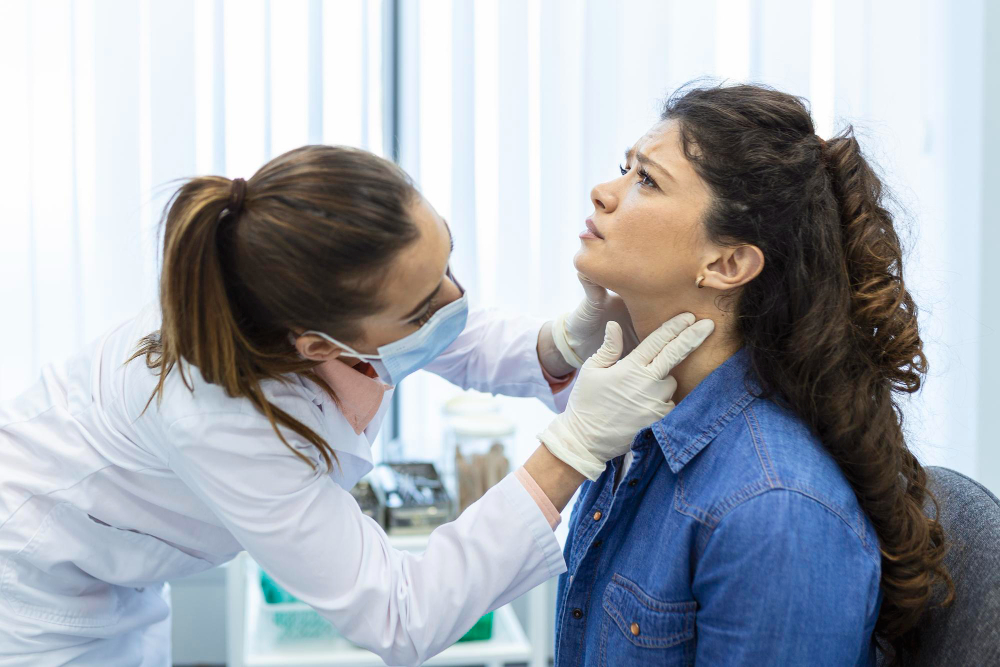The thyroid gland utilizes iodine in blood to produce two kinds of thyroid-stimulating hormones: triiodothyronine (T3) and thyroxine (T4). T4 tests and TSH tests are the two most common types of thyroid function tests. Has your doctor prescribed you a thyroid-stimulating hormone test, but you are unaware of what it means medically? Let us guide you about the TSH test procedure, the normal TSH range, and the symptoms and treatments pertaining to the high and low thyroid-stimulating hormone level.
What is the Thyroid Gland?
The thyroid gland is a small-sized gland located in the lower front portion of the neck. It is responsible for regulating several body processes, including metabolism, mood, and energy generation. This gland produces the triiodothyronine and tetraiodothyronine (also called thyroxin) hormones, both of which play vital roles in many body functions
What is a Thyroid Stimulating Hormone Test?
Thyroid-stimulating hormone tests or thyroid function tests consist of blood sample evaluation to detect the working of the thyroid gland. There are a few types of TSH tests, which include:
A TSH test is usually prescribed in case of concerns about the inefficient functioning of the thyroid gland. Other broad screening tests such as T4 are traditionally also prescribed in addition to TSH to root out the reasons behind emerging symptoms.
What to expect in a Thyroid Stimulating Hormone test procedure
A TSH test is a relatively uncomplicated, quick, and painless procedure that includes drawing a blood sample. A healthcare professional may tie an elastic band around your upper arm (blood samples are typically withdrawn from the inner side of the arm opposite to the elbow) and then disinfect the area. A needle is then inserted into a prominent vein to allow the blood into the connecting tube and vial. Once the vial contains enough blood for testing, the needle and elastic band are removed, and a piece of cotton or wool is placed over the puncture site to prevent or stop bleeding. A bandage is then applied to the site to avoid any infections. The blood sample is labeled and sent to the laboratory for testing.
A standard TSH test does not require any preparation. However, it is advisable to consult a physician if you take any prescription or nonprescription medicines lest they interfere with the test results. Head over to Cura4u if you are looking for certified medical specialists available 24/7!
Are there any side effects of TSH testing?
No, there are no harmful side effects of a TSH test. Some individuals may naturally feel a slight pinch at the insertion of the needle, and there might be some minor bleeding after the removal of the needle or signs of bruising for a couple of days. Dizziness, nausea at the sight of blood, and even unconsciousness in some extreme cases are some less common symptoms. Due to its simplicity, a TSH blood test procedure can also be carried out at home.
Why is a TSH test conducted?
A TSH test diagnoses common thyroid-related disorders such as hyperthyroidism and hypothyroidism. Hyperthyroidism is a medical condition dotted with the overproduction of thyroid hormones. This condition may result in the following symptoms:
-
Aggravated appetite
-
Irritability, anxiety, or mood swings
-
Fatigue or restlessness
-
Bulging, swollen eyes
-
Thinning of hair or skin
-
Elevated heat sensitivity
-
Excessive sweating
-
Irregular sleep
-
Muscle weakness
-
Changes in the menstrual cycle
-
Irregular heart rate
-
Weight loss
-
Abnormal swelling in the thyroid gland, also known as goiter
On the other hand, hypothyroidism is a condition where the thyroid gland under-produces hormones. Symptoms hinting at hypothyroidism include:
-
Depression, deteriorating mental health, or memory problems
-
Constipation
-
Aches and pains in the body
-
Thinning of hair
-
Increase in cholesterol
-
Decrease in heart rate
-
Dry skin, hoarse voice
-
Fatigue
-
Enlarged thyroid gland (goiter)
-
Changes in the menstrual cycle
-
Increased sensitivity to cold
-
Muscle weakness
-
Weight gain without apparent causes
A TSH test can also serve diagnostic purposes in other thyroid-related problems, including:
-
Graves Disease: promotes a higher activity of the thyroid gland.
-
Thyroiditis: Inflammation of the thyroid gland.
-
Thyroid nodules: increased activity of thyroid due to the formation of lumps on its surface.
-
Hashimoto’s thyroiditis: an autoimmune condition where the thyroid gland is attacked by the body.
-
Postpartum thyroiditis: temporary thyroiditis after pregnancy.
Normal TSH levels
The American Thyroid Association says that the standard TSH levels fall between 0.4 and 4.0 milliunits per liter (mU/L), although the upper limit may vary between 4-5 in different laboratories. Certain medications like opioid painkillers like morphine, steroids, or dopamine can cause a lower than regular reading.
Treatment for underactive and hyperactive thyroid gland
An underactive thyroid requires daily intake of a synthetic thyroid hormone pill which aids in getting the hormone levels back to normal. It is essential to get yourself tested every 2-3 months to ensure that you are taking the proper medication dosage. An overactive thyroid can be treated via several options, such as beta-blockers to reduce rapid heartbeat, anti-thyroid medications to prevent overproduction of hormones, radioactive iodine, or surgery for removal of the thyroid gland is less common cases.












